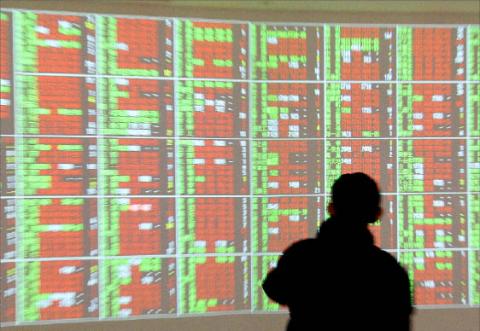The government said yesterday it would continue to use the state-run National Stabilization Fund to support the local stock market for the next three months, a move that is aimed at propping up investor confidence as the nation holds presidential and legislative elections today and amid macroeconomic uncertainty in the near term.
“The fund’s management committee has authorized continued intervention to ensure the stability of Taiwan’s stock market amid ongoing uncertainty over debt in some foreign countries,” the Ministry of Finance said in a press release.
The committee would continue to entrust state-owned financial institutions to invest in the market on behalf of the fund and thereby stabilize the stock market for three months, the release said.

Photo: CNA
The committee activated the fund on Dec. 20, the first time the fund has intervened in the stock market since September 2008. Since then, the TAIEX has risen 7.79 percent, or 518.9 points, closing at 7,181.54 yesterday, the second-highest climb in major stock markets in that period, data from the Taiwan Stock Exchange showed.
However, the TAIEX remains 13.66 percent lower than it was at the end of July last year, a -performance that only the Shanghai Composite Index has done worse than.
The TAIEX yesterday ended 5.04 points, or 0.07 percent, lower at 7,181.54, on turnover of NT$97.84 billion (US$3.27 billion), as political uncertainty ahead of today’s elections prompted investors to pocket early gains on the local bourse.
The NT$500 billion National Stabilization Fund continued its intervention, buying into large-cap stocks, such as Taiwan Semiconductor Manufacturing Co (TSMC, 台積電), smartphone maker HTC Corp (宏達電), Formosa Plastics Corp (台塑) and some financial firms, cushioning the impact of profit-taking, dealers said.
Low market turnover could be another reason the committee has authorized the intervention, they said. Based on stock exchange data, average daily turnover has fallen to as low as NT$71.3 billion in the local bourse since last month.
A reliable source told the Taipei Times yesterday that the fund had spent a total of NT$15.1 billion to stabilize the stock market as of the end of last year.
“Judging from the market movement, I think technical resistance ahead of the 7,200 point mark remains strong,” Horizon Securities (宏遠證券) analyst Benson Huang (黃重善) said.
“The election makes it even more difficult for the market to overcome technical hurdles at this time,” Huang added.
The silver lining was that some large-cap stocks remained resilient, thanks to the fund, although the broader market was overshadowed by non-economic factors, Huang said.
“The expanded turnover shows that some investors are willing to hunt bargains since the stabilization fund helped to restore market confidence to some extent,” he said.
“However, the market was still without a sense of direction,” he said. “Many are waiting for the political uncertainty to lift.”
Among the large-cap stocks, TSMC rose 0.65 percent to end the day at NT$77.50, HTC gained 3.78 percent to close at NT$481.00 and Formosa Plastics closed up 0.84 percent at NT$84.00.

Anna Bhobho, a 31-year-old housewife from rural Zimbabwe, was once a silent observer in her home, excluded from financial and family decisionmaking in the deeply patriarchal society. Today, she is a driver of change in her village, thanks to an electric tricycle she owns. In many parts of rural sub-Saharan Africa, women have long been excluded from mainstream economic activities such as operating public transportation. However, three-wheelers powered by green energy are reversing that trend, offering financial opportunities and a newfound sense of importance. “My husband now looks up to me to take care of a large chunk of expenses,

SECTOR LEADER: TSMC can increase capacity by as much as 20 percent or more in the advanced node part of the foundry market by 2030, an analyst said Taiwan Semiconductor Manufacturing Co (TSMC, 台積電) is expected to lead its peers in the advanced 2-nanometer process technology, despite competition from Samsung Electronics Co and Intel Corp, TrendForce Corp analyst Joanne Chiao (喬安) said. TSMC’s sophisticated products and its large production scale are expected to allow the company to continue dominating the global 2-nanometer process market this year, Chiao said. The world’s largest contract chipmaker is scheduled to begin mass production of chips made on the 2-nanometer process in its Hsinchu fab in the second half of this year. It would also hold a ceremony on Monday next week to

TECH CLUSTER: The US company’s new office is in the Shalun Smart Green Energy Science City, a new AI industry base and cybersecurity hub in southern Taiwan US chip designer Advanced Micro Devices Inc (AMD) yesterday launched an office in Tainan’s Gueiren District (歸仁), marking a significant milestone in the development of southern Taiwan’s artificial intelligence (AI) industry, the Tainan City Government said in a statement. AMD Taiwan general manager Vincent Chern (陳民皓) presided over the opening ceremony for the company’s new office at the Shalun Smart Green Energy Science City (沙崙智慧綠能科學城), a new AI industry base and cybersecurity hub in southern Taiwan. Facilities in the new office include an information processing center, and a research and development (R&D) center, the Tainan Economic Development Bureau said. The Ministry

ADVERSARIES: The new list includes 11 entities in China and one in Taiwan, which is a local branch of Chinese cloud computing firm Inspur Group The US added dozens of entities to a trade blacklist on Tuesday, the US Department of Commerce said, in part to disrupt Beijing’s artificial intelligence (AI) and advanced computing capabilities. The action affects 80 entities from countries including China, the United Arab Emirates and Iran, with the commerce department citing their “activities contrary to US national security and foreign policy.” Those added to the “entity list” are restricted from obtaining US items and technologies without government authorization. “We will not allow adversaries to exploit American technology to bolster their own militaries and threaten American lives,” US Secretary of Commerce Howard Lutnick said. The entities